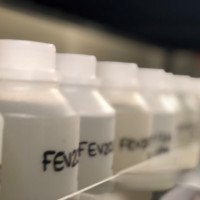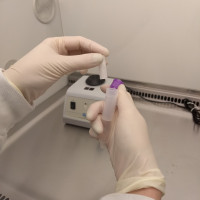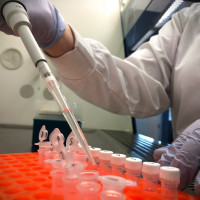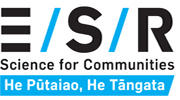Vaccine strategy modelling
In a major collaboration with Prof. Colin R Simpson (Victoria University of Wellington), and leading scientists and academics, ESR provides an interactive dashboard which seeks to forecast the outcomes of a range of possible models for New Zealand's COVID-19 response.
The publicly available dashboard, which is available here(external link) considered over 400,000 possible scenarios and provides the user with the ability to change various inputs such as maximum vaccination uptake per age group, minimum age for vaccination and vaccine effectiveness for disease prevention. The dashboard accopanies the study COVID-19 vaccine strategies for Aotearoa New Zealand: a mathematical modelling.(external link)
Genome sequencing
ESR was the first in New Zealand to sequence the genetic material of SARS CoV-2 from patients (external link)and since then it has become a key tool in our fight against COVID-19.
ESR are able to accept samples for urgent and routine sequencing in Auckland, Wellington, and our Christchurch facility is also able to accept samples for urgent sequencing. For a Q & A on genome sequencing - click here
 Wastewater research
Wastewater research
We are undertaking novel research into the testing of wastewater(external link) for the presence of SARS CoV-2. The overall goal long-term is for robust and reliable tools for the detection of SARS-CoV-2 in sewage, that can be used to identify any unrecognised COVID-19 infections in New Zealand. We also want to gauge how infectious it is in sewage and the persistence of SARS-CoV-2 in sewage.
View our Wastewater Testing Fact Sheet. [PDF, 363 KB]
Find out more about wastewater testing.
The communications and equity of COVID-19 surveilance has been researched by ESR and published on Figshare(external link). A summery of the research (October 2021) can be found here [PDF, 1.7 MB].
 Saliva testing
Saliva testing
ESR has a research project exploring whether individuals could give a saliva sample to be tested for SARS-CoV-2. This includes the Air NZ study. This is based on overseas work that suggests that there may be a role for a test that is more comfortable for people, that could therefore be used more frequently. A nasopharyngeal sample is currently the best practice tool for diagnosis, and this is unlikely to change with the introduction of saliva as a sample, but ESR is looking at whether saliva samples could be used in certain settings as a screening tool.

Flu research ties in COVID-19
We have extended our long-established flu research to include COVID-19(external link). Two large-scale and long-term studies, SHIVERS-II and WellKiwis, have expanded to include testing for SARS-CoV-2, the virus that causes COVID-19.
Research collaborations
We are collaborating with other organisations to research how we can use novel data sources and machine learning(external link) to predict further outbreaks of COVID-19.
Serology tests (antibody tests)
Regarding serology tests (where we look for antibodies from a previous COVID-19 infection), these are becoming more important as the pandemic progresses and we look to find those people who have had the disease but didn’t know they were ill. There are many such tests and understanding the value of various test options will be important in knowing how they can best be applied. ESR has been evaluating several tests. Additionally, we are awaiting ethics around a study in the serology area so keep your eyes peeled for this.
Potential for foodborne transmission of COVID-19
ESR has contributed to The New Zealand Food Safety Science & Research Centre (NZFSSRC) reports into the potential for foodborne transmission of SARS-CoV-2, and address industry questions around guidance on management practices. The latest (5th) version of the report(external link) was on Dec 15 2020 and uploaded on 14 Jan.
Exploring opportunities for sewage testing on ships as a tool to screen seafarers for COVID-19
New Zealand’s strategy to eliminate COVID-19 from the community carries an explicit requirement to identify and isolate all cases of COVID-19 arriving at the border to prevent incursions into the community. Under the Maritime Border Order (No. 2) 2020, arriving maritime crew may apply to disembark their vessel where all crew members have completed a 14-day isolation/quarantine, have returned a negative nasopharyngeal test, and are free from symptoms of COVID-19. This report [PDF, 1 MB] explores the potential application of sewage testing on ships arriving at the maritime border, as part of New Zealand’s border control processes.
